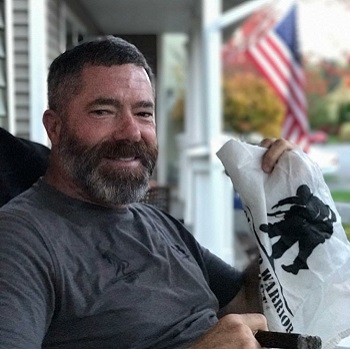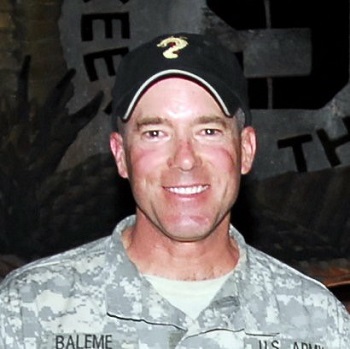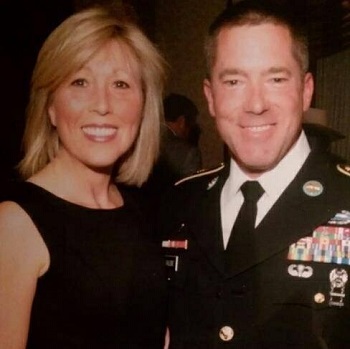Lee Baleme’s Post-Military Journey from Corporate America to Veteran Service
A True Purpose Found
Warrior Lee Baleme defines success as continued service to other veterans: “I truly feel after having been lost for all that time after getting out of the military, I am more welcomed and more part of something than ever. What I do is powerful. I develop a rapport with these warriors, and they tell me what’s happening in their lives.”
SEATTLE – After a 28-year Army career, Lee Baleme had no doubts that his natural leadership abilities would make for a successful transition to the civilian career world. Once he retired, however, he found the road to his post-military future was not as smooth as anticipated. Lee’s peaks and valleys presented themselves as professional setbacks, educational stalemates, and corporate acclaim. He began to discover true happiness when he started volunteering. This love of service led him to a career with Wounded Warrior Project® (WWP), where he serves and empowers injured veterans by coordinating events that give them opportunities to connect.
Continuing a Tradition
“My dad served more than 25 years in the Navy – World War II, Korea, and Vietnam,” Lee said. “He obviously had a tremendous amount to do with shaping who I am.”
Lee grew up in the naval town of San Diego. After graduating high school, he admitted he didn’t have much of a plan for adulthood. “I goofed around for a couple of years,” he said. “I really wanted to go to college, but I just didn’t have the focus and discipline at the time. I wasn’t mature enough.”
Lee spent several months living in American and Western Samoa, working on a fishing boat that took him throughout the South Pacific. He returned to San Diego longing for direction and structure in his life. Ready to make a bold decision, he became an Army infantryman. Like many young recruits, Lee’s plan was to serve his mandatory first years and venture out into the world as a civilian.
“I was hoping to get enough money for college, and then I would get out after four years,” he said. “After six years, I re-enlisted because I liked the camaraderie of the Army, and I liked my job. Then I’d planned on retiring after 20 years, but I realized I had become too much a part of the culture. I ended up staying until I had 28 years in.” During his military career, Lee established himself as a capable leader. After his initial tour in Iraq, he mentored young hopefuls in a ROTC program. He taught strategic counterinsurgency – think Jason Bourne stopping ISIS – in Afghanistan. Upon returning to the United States, he served as his unit’s operations sergeant major until his retirement.
Just before retiring, Lee earned a bachelor’s degree in business administration. He was unsure about a civilian career path, but he was certain his background would ensure immediate success. He quickly discovered that was not the case.
Highs and Lows
“I thought for sure I would have a job lined up after I retired,” Lee said. “A degree, all this management experience – I figured people would just be crawling after me.”
For months, Lee’s resume circulated without interest. But then he was offered a lucrative contract opportunity mentoring organizational leaders as they prepared for combat. He packed his bags and headed to the airport, fully prepared to spend a year in Kuwait. But the job fell through at the last minute. “I had said goodbye to my family, I had already checked my bags,” Lee said. “I got a call 15 minutes before boarding to tell me the entire thing had been canceled. It was a significantly emotional event. I was about to earn enough money to pay off my house, and I went from that to zero. I had absolutely nothing.”
Lee pondered his next move. He decided corporate America was his future after nearly three decades of government service.
“I wanted to transition fully from the military into this democratic, capitalist system,” he said. “I really wanted to be a part of it and feel like I was successful. Eventually, I linked with a professional mentor who told me the organization he was part of needed a management liaison to balance the scales with the union workers.”
The position was with a Fortune 500 waste management company – one of the biggest in the United States. Managing logistics and personnel, Lee began to feel like his professional life was on the upswing. His general manager was grooming him to become an operations manager.
One day, a hotheaded union worker became excessively vocal against Lee’s business practices, and Lee asked him to leave. “To make a long story short, he and another worker got me fired the day before Thanksgiving,” Lee said. “It was a real eye-opening experience for me. I had never failed like that in my life.”
Determined to enjoy the benefits of this unexpected career turn, Lee pulled back from corporate aspirations and spent some quality time with his family. Eventually, he got a call from a friend urging him to look into The Mission Continues (TMC), which offers a 26-week fellowship program that encourages participants to serve with nonprofit organizations of their choosing. “At the end of my 520 hours of community service for the program, I had gained a tremendous amount of understanding for the nonprofit sector,” he said. “Soon after, I became a volunteer with The Mission Continues Service Platoon.”
His work with TMC led him to a farm manager role at one of the three Soldier Homes in Washington state – VA-funded establishments that house veterans. Lee taught veterans the basics of farming and gardening. He accepted the position readily – and for no money. Gradually, he realized the work that truly made him happy was worlds beyond the corporate sector.
“To be willing to just give, it was a powerful and wonderful thing for me to feel that way,” he said. “Though I had given to my country for nearly 30 years, I finally understood the meaning of true service.”
Lee’s work on the farm connected him with various veterans service organizations, including WWP. “I started to ask more specific questions about Wounded Warrior Project to learn what it was about,” he said. “Soon, I realized it was the organization I really wanted to be a part of.”
“What I Do Is Powerful”
When Lee and his wife were invited to a WWP leadership summit in San Diego, he saw a larger vision: all the pieces involved in making an organization that serves and empowers injured veterans and their families. “I have to say it was an absolute blessing to be part of that event with other like-minded people,” Lee said. “But beyond that, I saw a lot going on in the background with the teammates – how they smiled at one another, how they worked together. There was coordination and teamwork.”
His resolve was strengthened, and soon Lee was reaching out to Warriors to Work® for support. He wanted his resume to actively portray his desire to take on a WWP position in Seattle. He was drawn to the chance to coordinate connection events that allow warriors to get out and bond with one another, while drawing them into the organization to learn about its programs and services.
“I got hired for the job,” he said. “I truly feel after having been lost for all that time after getting out of the military, I am more welcomed and more part of something than ever. What I do is powerful. I develop a rapport with these warriors, and they tell me what’s happening in their lives.”
Today, Lee says his work and life balance is where it should be, and that his family is proud of what he accomplishes working with injured veterans. After trying to move on from the military for so long, he said he finally realized it is where he is meant to be. And he has a similar message for warriors who might be thinking of reaching out to WWP.
“What you will come to realize is the military is a core culture in your value system now, and you need that,” he said. “Here, you can find that camaraderie and that sense of worth – that feeling you can’t get anywhere else. You are going to find people here who have embraced the same kind of hardships as you.”


